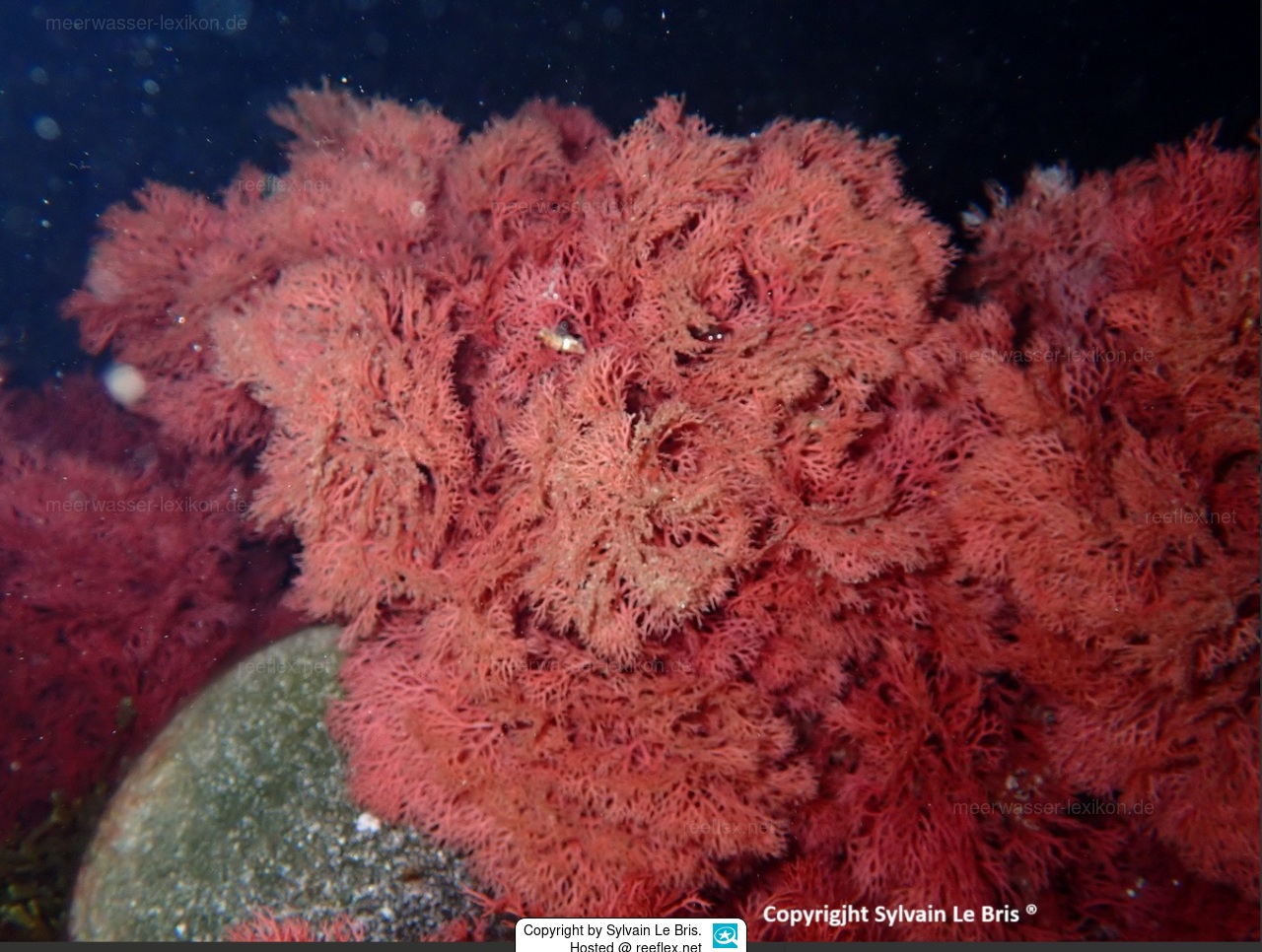Info
Slat is a bright red to dark red algae that is currently spreading rapidly in the Mediterranean Sea, quickly covering large rock formations and just as quickly overgrowing and displacing other species that live there.
Algae produce oxygen for all living things, and algae in the oceans produce more oxygen than all the forests on Earth, which means that slat is also an oxygen producer.
In addition, algae provide effective protection for small fish and many invertebrates.
Marine scientists view this rapid growth with mixed feelings.
Slat is of great interest in the development of pharmacological and medical research:
A raw Sphaerococcus coronopifolius extract in combination with Bacillus Calmette-Guerin has already shown very good results in ligature-induced depression in female Wistar rats. In addition, research is underway on its use in cancer therapies, as an anti-inflammatory agent and as an acetylcholinesterase inhibitor, as well as a natural agent against fouling processes on ship hulls.
It will certainly be some time before drugs containing algae extracts of this kind are approved, but it shows, as with many sponges, that nature can still provide us with many remedies and medicines if we allow it to do so and protect the oceans.
The available information on the depth distribution of the species varies greatly on the internet, with some sources indicating depths of up to 70 meters.
In this case, we refer to the publication by Prof. Dr. Wolfram Braune, “Meeresalgen - Ein Farbbildführer zu verbreiteten Grün,-Braun- und Rotalgen der Weltmeere” (Sea Algae - A Color Guide to Common Green, Brown, and Red Algae of the World's Oceans), which indicates a tidal range of up to 15 meters on page 324.
We would like to thank Sylvain Le Bris very much for his impressive photo of Sphaerococcus coronopifolius!
Synonyms:
Coronopifolia cartilaginea Stackhouse, 1809 · unaccepted
Coronopifolia coronopifolia Le Jolis, 1896 · unaccepted (synonym)
Coronopifolia coronopifolium (Goodenough & Woodward) Kuntze, 1898 · unaccepted (synonym)
Ethelia fissurata (P.Crouan & H.Crouan) Denizot, 1968 · unaccepted (synonym)
Fucus coronopifolius Goodenough & Woodward, 1797 · unaccepted
Haematocelis fissurata P.Crouan & H.Crouan, 1867 · unaccepted
Rhynchococcus coronopifolia (Stackhouse) Kützing, 1843 · unaccepted
Algae produce oxygen for all living things, and algae in the oceans produce more oxygen than all the forests on Earth, which means that slat is also an oxygen producer.
In addition, algae provide effective protection for small fish and many invertebrates.
Marine scientists view this rapid growth with mixed feelings.
Slat is of great interest in the development of pharmacological and medical research:
A raw Sphaerococcus coronopifolius extract in combination with Bacillus Calmette-Guerin has already shown very good results in ligature-induced depression in female Wistar rats. In addition, research is underway on its use in cancer therapies, as an anti-inflammatory agent and as an acetylcholinesterase inhibitor, as well as a natural agent against fouling processes on ship hulls.
It will certainly be some time before drugs containing algae extracts of this kind are approved, but it shows, as with many sponges, that nature can still provide us with many remedies and medicines if we allow it to do so and protect the oceans.
The available information on the depth distribution of the species varies greatly on the internet, with some sources indicating depths of up to 70 meters.
In this case, we refer to the publication by Prof. Dr. Wolfram Braune, “Meeresalgen - Ein Farbbildführer zu verbreiteten Grün,-Braun- und Rotalgen der Weltmeere” (Sea Algae - A Color Guide to Common Green, Brown, and Red Algae of the World's Oceans), which indicates a tidal range of up to 15 meters on page 324.
We would like to thank Sylvain Le Bris very much for his impressive photo of Sphaerococcus coronopifolius!
Synonyms:
Coronopifolia cartilaginea Stackhouse, 1809 · unaccepted
Coronopifolia coronopifolia Le Jolis, 1896 · unaccepted (synonym)
Coronopifolia coronopifolium (Goodenough & Woodward) Kuntze, 1898 · unaccepted (synonym)
Ethelia fissurata (P.Crouan & H.Crouan) Denizot, 1968 · unaccepted (synonym)
Fucus coronopifolius Goodenough & Woodward, 1797 · unaccepted
Haematocelis fissurata P.Crouan & H.Crouan, 1867 · unaccepted
Rhynchococcus coronopifolia (Stackhouse) Kützing, 1843 · unaccepted



 Sylvain Le Bris, Frankreich
Sylvain Le Bris, Frankreich

